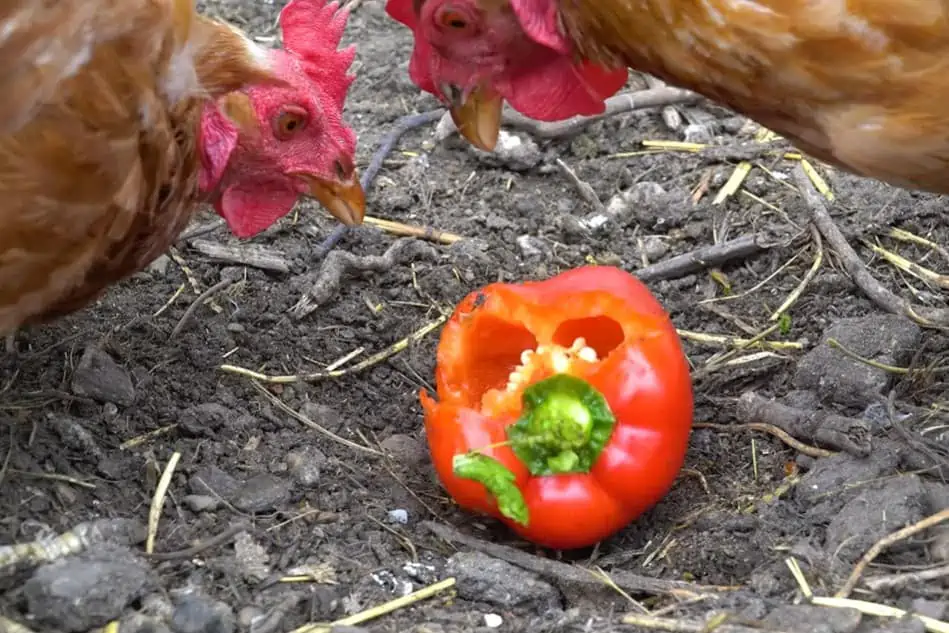Do bell peppers bother chickens? Would chickens be able to eat these seeds safely? Does it make a difference what colour pepper I use?
If you use bell peppers frequently and wish to feed some to your chickens in the backyard, these are all reasonable concerns to have.
To address your question, bell peppers pose no threat when fed to hens.
They’re a nutrient powerhouse, but there are a few things you should know before diving in.
Green, yellow and red bell peppers
While supermarket shopping, you have likely noticed that bell peppers come in a rainbow of colours.
First, let’s discuss the many kinds of bell peppers that exist before we answer the topic of whether or not hens can eat them.
Supermarkets have bell peppers in a rainbow of colours, from green to yellow to red.
Seeing how their prices vary, you might be curious as to what sets them apart.
Regardless of colour, bell papers (whether green, yellow, or red) all come from the same species of plant.
Because of the varying degrees of ripeness, however, their hues vary.
In practice, they vary in terms of flavour and nutritional value.
Green bell peppers
The green tint of unripe bell peppers is replaced by a more mature red as the fruit ages. If a bell pepper is green, it is not yet ripe.
The flavour of these bell peppers is rather bitter compared to those of the other colours.
Yellow bell peppers
Ripe bell peppers begin as a bright yellow and then mature into a vibrant orange.
At this point in time, bell peppers have reached their peak ripeness.
In contrast to the bitter flavour of green bell peppers, the yellow and orange varieties have a pleasant sweetness.
Red bell peppers
A crimson tint indicates full ripeness in bell peppers.
Among the numerous colours of bell peppers, red bell peppers are the most mature and have the sweetest taste.
Compared to green or unripe bell peppers, red bell peppers are the nutritional winner.
Three types of bell peppers, each with its own distinct colouration, are contrasted below.
| Colour | Ripeness | Taste |
| Green bell pepper | Unripe | Bitter |
| Yellow bell pepper | Fairly ripe | Sweet |
| Red bell pepper | Ripe | Sweeter than red and yellow |
Can chickens eat bell peppers?
Chickens can certainly eat bell peppers, to answer your question directly.
All colours and stages of maturity of bell peppers are fine to feed your chickens.
But the ripe ones, like yellow, orange, and red, are the healthiest options for feeding them.
Chickens, who are omnivores, meaning they will consume both plants and animals, will like snacking on bell peppers.
Can Chickens Eat Bell Peppers and Their Seeds?
Bell peppers are a type of plant in the nightshade family.
This means that they have a chemical in them called solanine, which is very dangerous for chickens.
Now, I’ve talked to a bunch of people who raise chickens in their backyards and feed them bell peppers. They all say it’s safe.
They say that solanine can only be found in the leaves, stems, and flowers.
The bell pepper, which is the fruit, is fine. The seeds inside are too.
This does make me a little worried, though. Just because of that, I don’t give my chickens bell peppers.
But I’m usually too cautious about things like that, and I’ve never heard of it being bad for chickens.
How Healthy Are Bell Peppers?
The good news is that they are exceptionally nutritious and wholesome, which will be appreciated by your chickens.
At roughly 92% water, bell peppers have a high water content with radishes.
That’s why they’re such a great summertime treat: they’re both tasty and cool.
Vitamin C, B6, K1, A, and E, among others, can be found in abundance, and they also include a variety of minerals.
In addition to being a good source of potassium and folate.
This is one of the healthier options for feeding them scraps and leftovers from the kitchen to supplement their run.
Do Chickens Like Bell Peppers?
Do you need evidence that hens enjoy bell peppers? You can watch some chickens go crazy over green peppers in this video.
Yet, there is some variation in the foods that hens will and will not eat.
You won’t know if your girls like peppers until you give them a taste.
You never know if they have colour preferences. I can’t decide if raw or cooked is better.
They may find it easier to eat cooked peppers, albeit they are much messier and softer.
Can chickens eat bell pepper steams and leaves?
The fruit of the bell pepper is edible, but you shouldn’t give your chickens the plant’s other parts, including the leaves, stalks, and blossoms.
There’s a good chance that these pieces could do more harm than good to your flock.
What makes bell peppers dangerous to chickens?
Chickens can safely consume bell pepper fruits. The same rules that prohibit feeding raw potatoes to poultry also apply to bell peppers.
The blooms, stalks, and leaves of bell peppers should be discarded. That puzzles me; please explain.
Tomatoes and potatoes and bell peppers all share a common ancestor: the nightshade family of plants.
The presence of solanine in nature is one of the many ways in which this family of plants stands apart.
When it comes to protecting itself from diseases and insects, solanine is a plant’s best protection.
Chickens, and other animals, can have serious health problems, and in the worst cases, death, if they consume solanine.
Can Chickens Eat Chili Peppers?
Hot peppers are safe for hens to eat. Any kind of chicken will love a treat of chilli peppers.
Incorporating chilli pepper into your chicken’s diet can help discourage pests by imparting a spicy flavour that they won’t enjoy.
Even chickens can tolerate chilli peppers’ intense heat.
Can Chickens Die from Eating Very Spicy Peppers?
Adult chickens probably won’t perish if they eat some very spicy peppers.
Your chickens can safely eat really hot pepper because it will simply make the feed hot.
The burning sensation that we humans get after eating hot peppers is not something that chickens will experience.
Even if you feed your hens particularly hot peppers, their health will improve.
However, very hot peppers should be avoided around young chicks because their developing systems just can’t handle the heat.
Juvenile chickens, especially those who are allergic to spicy chilli peppers, should not consume spicy peppers because they might be harmful to their health.


